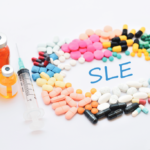
anyaivanova / shutterstock.com
A new biologic agent for treatment of systemic lupus erythematosus (SLE) being tested in clinical trials is showing promise as a safe and effective new treatment, particularly in patients with more severe disease or serologically active disease.
Recently published results of a study that examined the safety and efficacy of atacicept for SLE showed the biologic agent reduced disease activity and severe flares and was well tolerated.1
“The results reported in this paper provide hope that atacicept may have meaningful benefits for lupus patients,” says lead author, Joan T. Merrill, MD, of the Arthritis & Clinical Immunology Program at the Oklahoma Medical Research Association Oklahoma City. “And [it] seems to be safe and well tolerated when reasonable clinical safety measures are used.”
However, Dr. Merrill stresses that more study is needed because the trial did not meet its primary outcome measure. The main benefits seen in the study were in a subgroup of patients with more severe disease and/or serological activity.

Dr. Merrill
Given the complexity of lupus and the fluctuating nature of the disease, Dr. Merrill, who is also the chief advisor for clinical development for the Lupus Foundation of America, underscored that determining the best outcome measures to assess new treatments for lupus is an ongoing issue. “There are a lot of potential issues in interpreting the results of clinical trials in this disease,” she says.
Although the primary outcome measure of the study was not met, Dr. Merrill says the benefits in the subgroup of patients with more severe or serologically active disease confirms a pattern seen in other lupus trials, which have found greater differences between effective treatments and placebo when a more ill subset of patients is tested.
ADDRESS II: A Look at the Study
The ADDRESS II study was a phase 2b, multicenter, randomized, double-blind, placebo-controlled trial that tested the efficacy and safety of atacicept in patients with active lupus. Atacicept, a biologic agent that interferes with activation signals between T cells and B cells (subsets of white blood cells), was shown to reduce total B cell, plasma cell, and serum immunoglobulin levels in SLE patients in a previous study.2,3 It is seen as a potential therapeutic agent for lupus given that activated B cells are a classic feature of the disease.
A total of 306 patients were enrolled in the study and randomized to one of three treatment groups for 24 weeks: atacicept 75 mg (n=102), atacicept 150 mg (n=104), or placebo (n=100).

